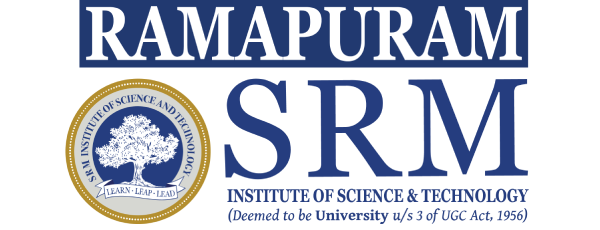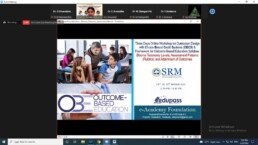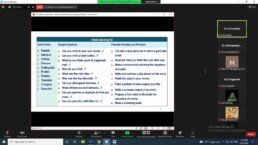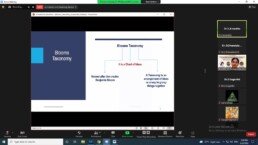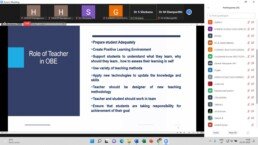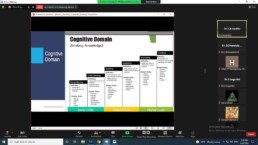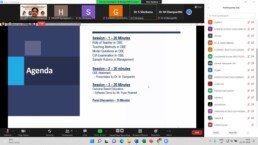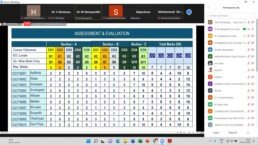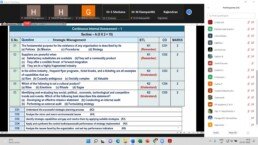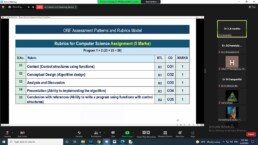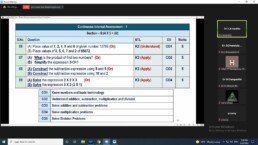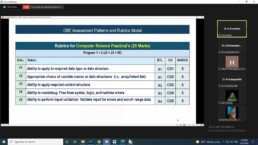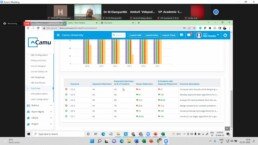SRM INSTITUTE OF SCIENCE AND TECHNOLOGY
RAMAPURAM CAMPUS
COLLEGE OF SCIENCE AND HUMANITIES
DEPARTMENT OF COMPUTER SCIENCE AND APPLICATIONS
====================================================
Dear All,
Greetings of the day!!!
The Department of Computer Science & Applications Organising the “Three Days workshop of Curriculum Design with Choice Based Credit Systems (CBCS) and Framework for Outcome Based Education (OBE)
Day 1 :
Date: 21.03.2022
Time:2.00 pm to 3.30 pm
Participants: UG/PG Students and all Faculty Members
Day 1 (21.3.2022 – Monday):
Guest Speaker
Dr.M.Elamparithi
Professor & Director
EDUPASS e-Academy Foundation
Title: Curriculum Design with Choice Based Credit Systems (CBCS) and OBE Framework
Dr.J.Dhilipan, Vice Principal/Admin and Head/MCA, presented the welcome address and he welcomed the chief guest of today’s Workshop.
He concluded his address by explaining the importance of Curriculum based Credit System and their importance to all the participants to get benefited from today’s session.
Dr.N.Asokan, Vice Principal/Academic, presented about this concept of Curriculum based Credit System and motivated all to get more knowledge from this Framework
Mr.N.Krishnamoorthy, Assistant Professor/MCA has gave the introduce our chief guest and finally welcome to our today’s chief guest and all.
TECHNICAL SESSION
=====================
Dr.M.Elamparithi gave the Lecture of Curriculum Design and OBE Framework.
The following points were emphasised and delivered by the resource person, Dr.M.Elamparithi:
CBCS- Introduction session involves how to evaluate the assessment and practices in education and how to reflect the attainment of expected learning.
Levels of Bloom’s Taxonomy–Remember, Understanding, Apply, Analyse, Evaluate and Create were explained this session.
How OBE is different from Traditional Education and why OBE needed for Higher Education System.
OBE vs Industry 4.0 –Taken the Curriculum for B.Sc degree and it satisfies the expectation of the industries.
OBE Framework consists of Feedbacks, Industry/Advisors, Academic Staff, Public and Parents and more.
OBE Curriculum Structure consists of Core courses, credits, preamble, and perquisites.
This outcomes PEO, PO and CO shown that this continuous process leads to refinement of evaluation and helps to enhance our higher education.
This helps to improve our education system and it satisfies the attributes of NAAC and NBA.
Simulation Study contains the OBE Approach, PEOs, POs & COs, CO-PO mapping and OBE Syllabus.
Then finally the role of faculty members to get appropriate guidance about assignments and projects.
The advantages are to enhance the quality of teaching and learning and to encourage continuity between UG,PG and Research education.
Then the entire session was opened to the audience for clarification of their doubts and interaction
Total no of participants benefited from the First Day of the Workshop:64
Day 2:
Date: 22.03.2022
Time : 2.00 pm to 3.30 pm
Participants: UG/PG Students and all Faculty Members
Guest Speaker
Dr. V. Anuratha
Professor & Secretary
EDUPASS e-Academy Foundation
Title: Blooms Taxonomy and Assessment Patterns (Rubrics)
WELCOME ADDRESS
==================
Dr.K.Sutha, Assistant Professor/MCA has started the session with delightful welcome address
Dr.D.Suganthi, Assistant Professor/MCA has given a brief introduction about the chief guest
TECHNICAL SESSION
===================
Dr. V. Anuratha has delivered the Lecture on Blooms Taxonomy and Assessment Patterns (Rubrics).
The following points were emphasised and delivered by the resource person, Dr. V. Anuratha:
Introduction of Blooms taxonomy and its importance for course outcomes
Six levels of Taxonomy from lower to higher levels like Knowledge (or) Remembering, Comprehension-Understanding, Application-Applying, Analysing-Analysis, Evaluation-Evaluating and Synthesis-Creating
The six levels of taxonomy is classified into three domains: cognitive, psychometric and affective domain
Potential activities and products related with Remembering like making a fact chart, listing of any pieces of information etc. It is a basic level and student should be strong in this level
Understanding is important and the words related with understanding are explain, interpret, predict, outline, discuss etc.
Applying deals about solve, use, illustrate, classify, complete, examine
Potential activities related to the analysis are making flow chart to show the critical stages, construction of graph to illustrate selected information, prepare a report about the area of study
Evaluation is about students evaluate a case scenario and can answer based on that.
The words related with the level “Create” are invent, compose, predict, plan, design, propose, formulate, devise
Cognitive domain deals about mental skills. It has stages like Sensorimotor, pre-operational, concrete operational and formal operational
Psychomotor domain deals about imitation, manipulation, precision, articulation and naturalisation
Affects domain deals about feeling and attitude
Chief Guest explained about the Grade III Mathematics Assessment pattern
Explained about the rubrics model for computer science practical, assignment and seminar presentations
Then the entire session was opened to the audience for clarification of their doubts and interaction
Total no of participants benefited from the second Day of the Workshop: 46
Day 3:
Date: 23.03.2022
Time : 2.00 pm to 3.30 pm
Participants: Faculty Members and Research Scholars
Guest Speaker
Dr. S. Shobana
Professor & Joint Treasurer
EDUPASS e-Academy Foundation
Title: Course Outcomes (COs) and Programme Outcomes (POs)
WELCOME ADDRESS
==================
Mr.N.Krishnamoorthy, Assistant Professor/MCA has started the session with delightful welcome address
Dr.J.Shobana, Assistant Professor/MCA has given a brief introduction about the chief guest
TECHNICAL SESSION
===================
Dr. S.Shobana has delivered the Lecture on Course Outcomes (COs) and Programme Outcomes (POs).
The following points were emphasised and delivered by the resource person, Dr.S.Shobana:
Role of Teacher in OBE: Support the students to understand what they learn, why should they learn how to assess their leaning in self
Teaching Methods in OBE: Various teaching methods were discussed such as activity profile, assignments, brainstorming, case studies and community surveys
Discussed about Model Questions and how to prepare question paper based on OBE.
CIA Examination in OBE: In the continuous internal assessment how to apply different course objectives (Remember, Understand, Apply, Analyse, Evaluate and Create)
Different Sample Rubrics in Management were discussed in detail
OBE Attainment: Discussed how OBE CO Attainment can be calculated and how to find the average CO attainment for a particular subject
Finally Live Software demonstration gives real-time experience on OBE and how to map each subject based on OBE
Then the entire session was opened to the audience for clarification of their doubts and interaction
Vote of Thanks delivered by Dr. K.Sutha, Assistant Professor of MCA Department, she thanked the Chief Guest for her intellectual address to Participants.
